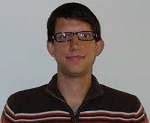All-Attosecond Pump-Probe Spectroscopy
All-Attosecond Pump-Probe Spectroscopy
Hosted By: Short Wavelength Sources and Attosecond/High Field Physics Technical Group
18 October 2023 10:00 - 11:00
The development of attosecond science at the beginning of the 21st century has led to exciting insights into fundamental electron dynamics taking place on extremely short timescales in atoms, molecules, liquids, solids and at the nanoscale. Since attosecond pulses are typically weak, they have been combined with femtosecond infrared pulses in the vast majority of experiments. However, attosecond science's full potential may only unfold when creating the ability to perform attosecond-pump attosecond-probe spectroscopy (APAPS).
Bernd Schütte will discuss recent progress on APAPS at up-scaled XUV intensities in this webinar. Furthermore, a new approach will be presented that makes it possible to perform APAPS at kilohertz repetition rates for the first time. In comparison to previous demonstrations of APAPS, this scheme uses a compact setup and has requirements similar to conventional attosecond experiments. As a consequence, APAPS may be performed in many laboratories around the world, benefitting from the very stable conditions and the good statistics that can be obtained using this approach.
In the webinar, Dr. Schütte will compare his table-top APAPS schemes to the recently reported APAPS capability at the free-electron laser LCLS, discussing both the advantages and disadvantages of these two complementary approaches. Finally, possible applications will be presented, including charge migration in biologically relevant systems and multi-electron correlation processes.
Subject Matter Level: Intermediate - Assumes basic knowledge of the topic
What You Will Learn:
• What are the challenges and perspectives of attosecond-pump attosecond-probe spectroscopy
• Comparison of approaches from table-top setups and large-scale facilities
Who Should Attend:
• Graduate students of ultrafast laser science
• Researchers on attosecond science and technology
About the Presenter: Bernd Schütte from Max-Born Institut
 As a child Bernd Schütte developed an interest in astronomy, being fascinated by the extreme length and time scales of the universe. During his undergraduate studies at TU Dresden and Lund University he came in contact with the other extreme, studying ultrafast dynamics on atomic spatial scales. He was fascinated by the ability to observe and control these dynamics using extremely short laser pulses. Consequently, he performed his PhD work on ultrafast dynamics at the University of Hamburg, where he investigated Auger-Meitner decay processes. In 2011 Bernd Schütte received his PhD and joined the Max-Born-Institut (MBI) in Berlin as a PostDoc, where he developed an intense XUV beamline and studied ultrafast processes in nanoplasmas, He continued this work during his stay at the Imperial College in London from 2014-2016. Afterwards he returned to the MBI and became group leader in 2020, where he and his team develop and apply attosecond-pump attosecond-probe spectroscopy.
As a child Bernd Schütte developed an interest in astronomy, being fascinated by the extreme length and time scales of the universe. During his undergraduate studies at TU Dresden and Lund University he came in contact with the other extreme, studying ultrafast dynamics on atomic spatial scales. He was fascinated by the ability to observe and control these dynamics using extremely short laser pulses. Consequently, he performed his PhD work on ultrafast dynamics at the University of Hamburg, where he investigated Auger-Meitner decay processes. In 2011 Bernd Schütte received his PhD and joined the Max-Born-Institut (MBI) in Berlin as a PostDoc, where he developed an intense XUV beamline and studied ultrafast processes in nanoplasmas, He continued this work during his stay at the Imperial College in London from 2014-2016. Afterwards he returned to the MBI and became group leader in 2020, where he and his team develop and apply attosecond-pump attosecond-probe spectroscopy.
